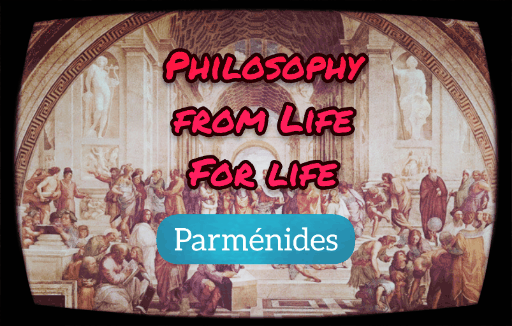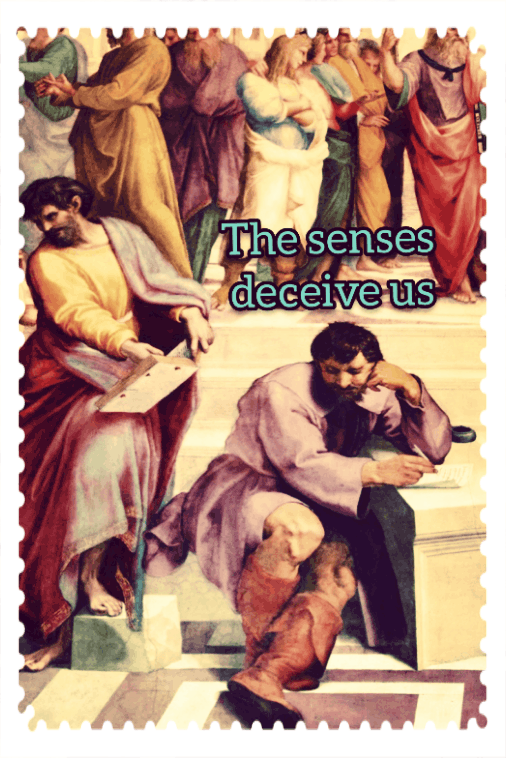[Esp-eng] Philosophical initiative ¿Confianza en los sentidos? || Trust in the senses?

Source
Saludos amigos, hoy es hora de nuestra publicación filosófica y, primeramente, quiero manifestar mi alegría porque, aunque todavía en sus comienzos, está teniendo muy buena acogida. De hecho, son este tipo de publicaciones las que me han generado más y mejores comentarios.
Es esta una de las ventajas de la filosofía, pueden pasar los años, estar pasando por otras circunstancias, entre otras variantes, y, sin embargo, seguir siendo fuente de reflexión para el ser humano.
Sí, no importa el tiempo, si lo que un filósofo o una disputa filosófica ha tratado es interesante y verdadero, por lo menos en cierto sentido, su valor permanece en el tiempo. Precisamente, en este día voy a comentarles la siguiente frase o idea filosófica perteneciente a un filósofo bastante antiguo, Parménides de Elea (Siglo VI, AC): “Los sentidos nos engañan”
Greetings friends, today it is time for our philosophical publication and, first of all, I want to express my joy because, although it is still in its early stages, it is being very well received. In fact, it is this type of publication that have generated more and better comments for me.
This is one of the advantages of philosophy, the years may go by, other circumstances may arise, among other variants, and yet it continues to be a source of reflection for the human being.
Yes, time does not matter, if what a philosopher or a philosophical dispute has dealt with is interesting and true, at least in a certain sense, its value remains in time. Precisely, on this day I am going to comment on the following phrase or philosophical idea belonging to a rather ancient philosopher, Parmenides of Elea (VI century, BC): "The senses deceive us"

Significado
Meaning


Source
Parménides es un filósofo que se ubica en el periodo pre-socrático, es decir, antes del famoso Sócrates y que destaca dentro de la historia de la filosofía por ser uno de los primeros pensadores que resalta en el ser humano el papel de la razón, por encima de cualquier otra facultad.
Por eso, para él lo más importante es definir la inamovilidad del ser, es decir, su permanencia a través de los cambios del tiempo, de allí que la característica que más va a resaltar en todo lo que existe es su inmutabilidad, aquellos que permanece a pesar de las transformaciones por las cuáles se haya podido pasar.
Así se entiende mejor su pensamiento, pues, lo que quiere expresarnos es que no podemos fiarnos de los sentidos, que ven sólo lo exterior, cuando – como dice el principito – lo esencial está oculto a los ojos.
Parmenides is a philosopher who is located in the pre-Socratic period, that is, before the famous Socrates and who stands out within the history of philosophy for being one of the first thinkers who highlights in the human being the role of reason, above any other faculty.
That is why, for him, the most important thing is to define the immobility of the being, that is, his permanence through changes in time, hence the characteristic that will stand out in everything that exists is his immutability, those that remain in spite of the transformations through which he may have passed.
Thus his thought is better understood, for what he wants to express to us is that we cannot trust the senses, which see only the exterior, when - as the little prince says - the essential is hidden from the eyes.

Análisis
Analysis


Uno de mis mejores profesores me enseñó que en la filosofía no hay respuestas absolutas y que, por eso, lo mejor que podemos hacer ante cierta postura, corriente o pensamiento filosófico es usar la siguiente palabra mágica: “Distingo”, lo que quiere decir que diferenciemos lo que está bien, lo verdadero, de lo que no, lo falso.
Así, en esta afirmación de Parménides puedo rescatar que ciertamente los sentidos, a veces, nos engañan, ya que nos hacen ver (oír, oler, gustar, tocar, etc.) cosas que no son tal cual y, por ello, terminar teniendo una errónea percepción de las cosas.
Pero no siempre es así, de hecho, todo lo que conocemos pasa primero por los sentidos dirá más adelante otro filósofo. De allí que más bien hay que buscar complementar el conocimiento sensible con el racional, pues, éste al fin y al cabo necesita un fundamento empírico, aunque sea en cierta forma, de sus conclusiones.
One of my best teachers taught me that in philosophy there are no absolute answers and that, therefore, the best thing we can do in the face of a certain position, current or philosophical thought is to use the following magic word: "I distinguish", which means that we differentiate what is right, what is true, from what is not, what is false.
So, in this affirmation of Parmenides I can rescue that certainly the senses, sometimes, deceive us, since they make us see (hear, smell, taste, touch, etc.) things that are not as they are and, therefore, end up having a wrong perception of things.
But it is not always so, in fact, everything we know passes first through the senses, another philosopher will say later. Hence, one should rather seek to complement sensitive knowledge with rational knowledge, since, after all, the latter needs an empirical foundation, even if in a certain way, of its conclusions.

Aplicación
Application


- Transcender el plano empírico. A veces, nos quedamos atrapados en el mundo que nos permiten captar nuestros sentidos, cuando en realidad, el mundo que nos rodea es mucho más complejo y profundo.
Por eso, no hay que limitarse al conocimiento obtenido por algún sentido (por ejemplo, conozco la personalidad de “x” sujeto) sino que lo podamos enriquecer con otros aportes (complemento lo que aprendí empíricamente de la personalidad de “x” sujeto con, por ejemplo, lo que nos enseña la psicología).
- No es sólo la primera impresión. Dice el refrán que la primera impresión es lo que vale pero no siempre es así, de hecho, lo mejor es verificar lo que hemos captado en una primera impresión con una segunda, tercera y así sucesivamente, porque en realidad nunca terminamos de conocer en profundidad las cosas y mucho menos a las personas.
Por eso, no es suficiente con que oigas hablar de alguien, si quieres de verdad obtener un conocimiento lo más completo posible de su persona, sino que habría que irlo a ver, conversar directamente, compartir, etc.
- Volver una y otra vez al objeto de conocimiento. En ocasiones algún error en nuestra percepción sobre la realidad se resuelve si volvemos, con nuestros sentidos, al objeto de conocimiento.
Por ejemplo, cuando alguien te dice la casa de “x” persona es de color verde y tú afirmas que es de color azul, hasta que vuelven a la casa, y – efectivamente – compruebas que estabas equivocado, porque la casa es verde.
- Transcend the empirical plane. Sometimes, we get stuck in the world that allows us to capture our senses, when in reality, the world around us is much more complex and profound.
For this reason, we must not limit ourselves to the knowledge obtained by some sense (for example, I know the personality of "x" subject) but we can enrich it with other contributions (I complement what I learned empirically from the personality of "x" subject with, for example, what psychology teaches us).
- It is not only the first impression. The saying goes that the first impression is what counts but it is not always so, in fact, the best thing is to verify what we have captured in a first impression with a second, third and so on, because in reality we never finish knowing things in depth and much less people.
Therefore, it is not enough that you hear about someone, if you really want to get as complete knowledge as possible of his person, but you should go to see him, talk directly, share, etc.
- Return again and again to the object of knowledge. Sometimes some error in our perception of reality is resolved if we return, with our senses, to the object of knowledge.
For example, when someone tells you the house of "x" person is green and you affirm that it is blue, until they return to the house, and - effectively - you prove that you were wrong, because the house is green.

Muchas gracias por haberme acompañado en la lectura de este post, espero tus comentarios y que nos podamos volver a encontrar en una próxima publicación, hasta luego.
Thank you very much for having accompanied me in the reading of this post, wishing you always the best and that we can meet again in a next publication, I say goodbye, see you later.


- Traducido con www.DeepL.com/Translator || Translated with www.DeepL.com/Translator
- Los emojis se hacen con Bitmoji.com || The emojis are made with Bitmoji.com
Este Post será compartido en Twitter con hastags #hive y #posh para promover la iniciativa "Prueba de Compartir" de Hive y @ocd || This post will be shared in Twitter with hastags #hive and #posh to promote Hive and @ocd "Proof of Share" initiative.


https://twitter.com/JBitcoins/status/1313149465331740673
Congratulations @jesusalejos! You have completed the following achievement on the Hive blockchain and have been rewarded with new badge(s) :
You can view your badges on your board and compare yourself to others in the Ranking
If you no longer want to receive notifications, reply to this comment with the word
STOPDo not miss the last post from @hivebuzz:
Disfrute mucho tu post!! Me hiciste recordar las clases de filosofia antigua cuando estudiamos a Parmenides. Aunque debo admitir que soy más del equipo de Heráclito. Basicamente entre Heráclito y Parmenides estan contenidas las corrientes fiosoficas a lo largo de la historia. Saludos
Me alegra lo hayas disfrutado, amigo, y sí, prácticamente ambos proyectan las dos vertientes generales, entre las que se moverán las diversas corrientes filosóficas.
Posted using Dapplr